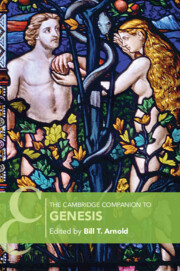Book contents
- The Cambridge Companion to Genesis
- Cambridge Companions to Religion
- The Cambridge Companion to Genesis
- Copyright page
- Contents
- Abbreviations
- Contributors
- 1 Introduction: Genesis and the status quaestionis
- Part I Composition and Structure of Genesis
- Part II Social World of Genesis
- Part III Themes and Literary Motifs of Genesis
- 10 From Imago to Imagines: The Image(s) of God in Genesis
- 11 Genesis, Science, and Theories of Origins
- 12 Genesis and Ethics
- 13 Genesis and the Problem of Evil: Philosophical Musings on the Bible’s First Book
- Part IV Reception History of Genesis
- Scripture Index
- Subject Index
- Cambridge Companions to Religion (continued from page iii)
- References
12 - Genesis and Ethics
from Part III - Themes and Literary Motifs of Genesis
Published online by Cambridge University Press: 02 June 2022
- The Cambridge Companion to Genesis
- Cambridge Companions to Religion
- The Cambridge Companion to Genesis
- Copyright page
- Contents
- Abbreviations
- Contributors
- 1 Introduction: Genesis and the status quaestionis
- Part I Composition and Structure of Genesis
- Part II Social World of Genesis
- Part III Themes and Literary Motifs of Genesis
- 10 From Imago to Imagines: The Image(s) of God in Genesis
- 11 Genesis, Science, and Theories of Origins
- 12 Genesis and Ethics
- 13 Genesis and the Problem of Evil: Philosophical Musings on the Bible’s First Book
- Part IV Reception History of Genesis
- Scripture Index
- Subject Index
- Cambridge Companions to Religion (continued from page iii)
- References
Summary
Biblical ethics reflects upon maxims of moral behavior from the perspective of normative good and examines its legitimations and justifications, as well as the consequences of what can be called a morally positive or negative behavior. If maxims of good behavior are to be derived from historical narrative traditions, such an undertaking is confronted with the problem that implicit maxims of moral behavior are entangled with a number of other motifs and can never be isolated purely. The narratives of the Bible are subject to this challenge for any reconstruction of a historical ethos and its ethics. Their moral maxims were also anchored in the cultural contexts and ideals of their time. Although biblical narratives, including some in the book of Genesis, were ethically self-reflecting, they participated in the historicity of the cultural ideal motifs of their time.1 The solution for the resulting hermeneutical problem for any historical ethics due to the “nasty gap of history” (Gotthold Ephraim Lessing) – the tensions between modern ethical maxims and those of the Bible – is the main problem for any biblical ethics of the Torah or more specifically, the book of Genesis.
- Type
- Chapter
- Information
- The Cambridge Companion to Genesis , pp. 262 - 280Publisher: Cambridge University PressPrint publication year: 2022



